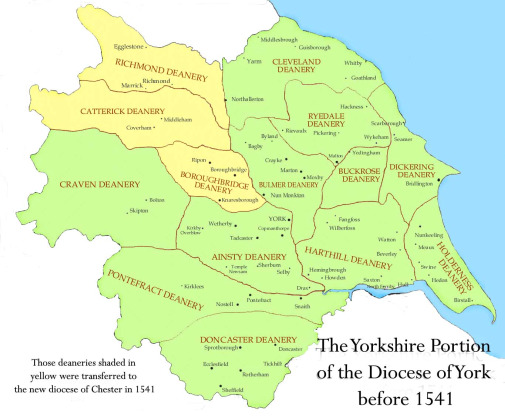Guide to Probate Courts

Probate Records at the Borthwick: an introduction to the various courts and their jurisdictions.
- Introduction
- Probate Records from other Parts of the Northern Province
- Probate Records from the Southern Province
Introduction
Before January 1858 a complicated network of probate courts existed to deal with the distribution of property following a person's death. The majority of business took place in the courts of bishops, with each bishop enjoying probate jurisdiction within most of his own diocese.
The right to grant probate could, however, be attached to peculiar jurisdictions, or to manorial courts, presided over by ecclesiastical or lay lords. These jurisdictions sometimes covered only one village, but could cover wider areas.
- Was it a Peculiar? (Peculiar jurisdictions (PDF
 , 154kb))
, 154kb))
There were in addition two higher levels of jurisdiction above each diocesan bishop.
- When a testator had goods in more than one diocese of the northern province (diocese of Chester, Carlisle, Durham and York), or in more than one jurisdiction within the northern province (e.g. goods in both a peculiar of Dean and Chapter and in the jurisdiction of the archbishop) the Prerogative Court of York had the right to grant probate.
- If the testator had goods within both the northern and southern province then the Prerogative Court of Canterbury had the right to grant probate. For records of the Prerogative Court of Canterbury contact the National Archives.
This system was dismantled in 1858, when civil probate registries were established. Copies of probate records can be ordered from The Postal Copies and Searches Department, District Probate Registry, York House, York Place, Leeds, LS1 2BA. You can also search for and order wills online through the Gov.uk website. Copies of the indexes are available at the National Archives.
The National Library of Wales, Aberystwyth, SY23 3BU, holds volumes of copy wills from 1858-1940. Scottish wills are held by the National Archive of Scotland.
Yorkshire Probate Records, before 1858
The Borthwick holds the vast majority of probate records for Yorkshire before January 1858. The major exceptions are:
- That portion of Yorkshire which although in the county of Yorkshire formed part of the diocese of Chester after 1541, namely the archdeaconry of Richmond. Most of the probate records for this area are held by West Yorkshire Archive Service: Leeds. Note, however, that we may still have probate records for people who died in these areas if they came under the jurisdiction of the Prerogative Court of York.
- Those records from the Commonwealth period (1653-60) which were proved in London. In 1653 a civil probate court was established in London with jurisdiction over the whole county. In theory all wills of persons dying in this period should be amongst the records of the court, the records of which are held by The National Archives. However, it appears that some executors and administrators avoided this new court because of the expense and inconvenience involved. Some wills seem to have been implemented without formal probate, others were proved retrospectively after the restoration of the ecclesiastical courts in 1660.
- Probate records of those people who held land both in Yorkshire, and in one of the dioceses of the Southern Province. The Prerogative Court of Canterbury had jurisdiction over such cases.
Exchequer and Prerogative Court of York
The extent of the jurisdiction of these courts is not entirely clear, especially in the medieval period, but a general outline can be drawn.
The exchequer court exercised jurisdiction over lay men and unbeneficed clergy (that is who were not rectors or vicars), who had goods in the diocese of York.
Note that until 1837 Nottinghamshire was part of the diocese of York, and wills were proved at York. However, all original probate records proved in the Exchequer court have now been transferred to Nottinghamshire Archives. Registered copies of these wills, however, remain at the Borthwick.
Original wills in the Exchequer court exist from 1427, but there are very few until 1591. After 1630 their survival is fairly complete. Registered copies of wills exist from 1389-1858, but there are some gaps in the 15th and 16th centuries, as well as for the Commonwealth period.

The exchequer court used the rural deaneries (see map) to organise its work, so that wills are arranged in bundles according to the deanery in which the testator lived, and according to the month and years in which the will was proved.
The Prerogative Court had jurisdiction over people with goods in more than one jurisdiction within the diocese or who had goods in more than one of the northern dioceses. Like the Exchequer court a few early original wills do survive, but only from 1630 is the survival fairly complete.
Chancery Court
The chancery court exercised probate jurisdiction over beneficed clergy of the diocese and during episcopal visitations, that is when the bishop made a special inspection. However, is seems that from about 1822, wills of beneficed clergy were proved in the Prerogative Court. Original wills survive from 1535-1857, and registered copies in the archbishops registers 1316-1858. Grants of administration, recorded in the Chancery act books survive for the years 1525-1855.
Volume 73 of the Yorkshire Archaeological Record Series contains an index to the original Chancery wills, erroneously entitled Consistory Court wills. However, the volume is misleading in two ways, firstly some of the material indexed here has been subsequently found to have been proved in the exchequer court and secondly, more chancery material has been found that has not been included in this volume. An index to the registered copies of the chancery wills 1316-1822 is printed in volume 93 of the Yorkshire Archaeological Record Series. Further indexes are available at the Borthwick.
Dean and Chapter Court
This court exercised jurisdiction on behalf of the archbishop during vacancies of the see. Original documents survive for most vacancies from 1464, but they are numerically very few until the vacancies of the seventeenth century. Note that wills proved in the vacancies of 1691, 1714, 1747 and 1757 are with the records of the Exchequer Court. Vacancy probate registers exist for the years 1638, 1686-8, 1724, 1807 and 1847, and probate act books for the years 1559-61, 1568-70, 1683, 1686.
As well as vacancy jurisdiction, the Dean and Chapter also had its own peculiar jurisdiction over about 15 parishes in Yorkshire, 14 in York City, 6 in Nottinghamshire and 3 in Lancashire, and exercised probate jurisdiction in other peculiars in the diocese when undertaking a visitation of them.
Original wills, inventories and administrations exist from the 14th century, probate registers for the years 1321-1638 and 1809-1858 and probate act books for the years 1546-1636 and 1665-1673. The registers 1321-1558 and all the act books are held by York Minster Library.
- Further information about the Peculiar jurisdictions (PDF
 , 154kb)
, 154kb)
Probate Records from other Parts of the Northern Province
The Prerogative Court of York had jurisdiction over cases in which the deceased had left goods in more that one of the northern dioceses, that is the dioceses of Durham, Carlisle, Chester. If a deceased person had goods in only one of these dioceses his probate would have been dealt with by the appropriate diocesan probate courts.
Probate Records from the Southern Province
The best place to start looking for probate records is in the relevant County Record Office. The highest level of jurisdiction in England and Wales was the Prerogative Court of Canterbury.
For a summary of this information in pdf format:

